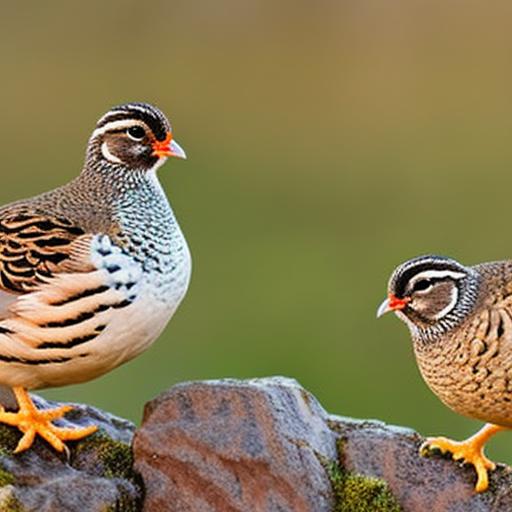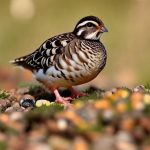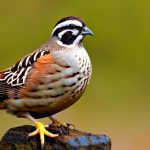When it comes to keeping quails, choosing the right enclosure is crucial for their well-being. Quails are small birds that require a safe and secure space to live in. The enclosure should be spacious enough to allow the quails to move around freely and engage in natural behaviors such as dust bathing and foraging. It is important to consider the number of quails you plan to keep and choose an enclosure that can accommodate them comfortably. Additionally, the enclosure should be predator-proof to protect the quails from potential threats such as cats, dogs, and other wildlife.
The material of the enclosure is also an important factor to consider. A sturdy and durable material such as wire mesh or wood is ideal for building a quail enclosure. The flooring of the enclosure should be solid and easy to clean, as quails are known to produce a significant amount of waste. It is also important to provide adequate ventilation in the enclosure to ensure good air quality and prevent the buildup of ammonia from the quails’ waste. Overall, choosing the right enclosure for your quails is essential for their safety, comfort, and overall well-being.
Key Takeaways
- Choose an enclosure that provides enough space for your quails to move around and has proper ventilation
- Provide bedding and nesting materials such as straw or wood shavings to create a comfortable and safe environment for your quails
- Maintain proper lighting and temperature to mimic their natural habitat and promote healthy growth
- Feed your quails a balanced diet and ensure they have access to clean water at all times
- Ensure proper ventilation to prevent the buildup of ammonia and maintain good air quality in the enclosure
- Keep the indoor environment clean and hygienic to prevent the spread of diseases and parasites
- Monitor your quails for any signs of illness and address any health issues promptly to ensure their well-being
Providing the right bedding and nesting materials
In addition to a suitable enclosure, providing the right bedding and nesting materials is essential for the health and well-being of your quails. Quails require a comfortable and clean bedding material to rest on and absorb their waste. Wood shavings, straw, or sand are commonly used as bedding materials for quails. These materials provide a soft and absorbent surface for the quails to rest on, as well as help maintain cleanliness in the enclosure.
Nesting materials are also important for quails, especially if you plan to breed them. Quails will need a suitable nesting area with materials such as hay, straw, or shredded paper to build their nests and lay their eggs. Providing the right nesting materials will encourage natural nesting behaviors in quails and help ensure the safety and well-being of their eggs. It is important to regularly clean and replace the bedding and nesting materials to maintain a clean and hygienic environment for your quails.
Maintaining proper lighting and temperature
Maintaining proper lighting and temperature is crucial for the health and well-being of your quails. Quails require a consistent light-dark cycle to regulate their internal clock and maintain healthy behavior patterns. Providing 14-16 hours of light per day is recommended for quails, as this mimics their natural environment and encourages normal activity levels, feeding, and egg production.
In addition to lighting, maintaining the right temperature is essential for quails, especially in indoor environments. Quails are sensitive to extreme temperatures and can suffer from heat stress or cold stress if not properly regulated. The ideal temperature for quails is between 60-75 degrees Fahrenheit. It is important to provide a heat source such as a heat lamp or heating pad during colder months to keep the quails warm and comfortable. Conversely, during hot weather, it is important to provide adequate ventilation and shade to prevent overheating. Monitoring and maintaining proper lighting and temperature will help ensure the health and well-being of your quails.
Feeding and watering your quails
Feeding and watering your quails is an essential part of their care and requires careful attention to ensure they receive the proper nutrition. Quails are omnivorous birds that require a balanced diet of commercial quail feed, fresh fruits, vegetables, and protein sources such as mealworms or small insects. It is important to provide a high-quality commercial quail feed that is specifically formulated for their nutritional needs. Additionally, offering a variety of fresh fruits and vegetables will provide essential vitamins and minerals to keep your quails healthy.
In addition to feeding, providing clean and fresh water is crucial for quail health. Quails require access to clean water at all times to stay hydrated and maintain proper bodily functions. It is important to regularly clean and refill their water containers to prevent contamination and ensure a safe drinking source for your quails. Monitoring their feeding and watering habits will help you assess their health and make any necessary adjustments to their diet or water supply.
Ensuring proper ventilation and air quality
Proper ventilation and air quality are essential for maintaining a healthy environment for your quails. Good ventilation helps remove excess moisture, ammonia, and airborne pathogens from the enclosure, which can lead to respiratory issues in quails if not properly managed. It is important to provide adequate airflow in the enclosure by installing vents or windows that can be opened to allow fresh air to circulate.
In addition to ventilation, maintaining good air quality is crucial for the health of your quails. Regularly cleaning the enclosure, removing waste, and providing clean bedding will help reduce ammonia levels and prevent the buildup of harmful bacteria in the air. It is also important to monitor humidity levels in the enclosure, as high humidity can lead to respiratory problems in quails. Ensuring proper ventilation and air quality will help create a safe and healthy environment for your quails to thrive.
Keeping the indoor environment clean and hygienic

Keeping the indoor environment clean and hygienic is essential for the health and well-being of your quails. Quails produce a significant amount of waste, so it is important to regularly clean their enclosure to prevent the buildup of ammonia and harmful bacteria. Removing soiled bedding, droppings, and uneaten food will help maintain cleanliness in the enclosure and reduce the risk of disease.
In addition to regular cleaning, it is important to disinfect the enclosure periodically to eliminate any potential pathogens or parasites that may be present. Using a mild disinfectant solution or natural cleaning products will help keep the enclosure clean without exposing your quails to harmful chemicals. It is also important to regularly inspect the enclosure for any signs of damage or wear that may compromise its integrity or safety.
Monitoring and addressing any health issues
Monitoring your quails’ health is crucial for early detection of any potential issues that may arise. Regularly observing their behavior, appetite, droppings, and overall appearance will help you identify any changes that may indicate a health problem. Common health issues in quails include respiratory infections, parasites, egg binding, and injuries.
If you notice any signs of illness or injury in your quails, it is important to address them promptly by seeking veterinary care or administering appropriate treatment. Providing a balanced diet, clean water, proper lighting, temperature regulation, ventilation, and hygiene will help prevent many common health issues in quails. Regular health checks and proactive care will help ensure the long-term health and well-being of your quails.
If you’re interested in keeping quails indoors, you may also want to check out this informative article on creating the perfect chicken coop for your feathered friends. The article provides valuable insights into designing a comfortable and functional living space for chickens, offering tips on ventilation, lighting, and layout. You can read the full article here.
FAQs
What are the benefits of keeping quails indoors?
Keeping quails indoors can provide a controlled environment for their safety and well-being. It also allows for easier monitoring of their health and behavior.
What are the key considerations for keeping quails indoors?
Key considerations for keeping quails indoors include providing adequate space, proper ventilation, suitable bedding, and a balanced diet. It’s also important to consider noise levels and potential odor control.
How can I set up a suitable indoor environment for quails?
To set up a suitable indoor environment for quails, you will need a spacious enclosure with proper ventilation, suitable bedding such as straw or wood shavings, access to clean water and a balanced diet of quail feed.
What are the dietary requirements for indoor quails?
Indoor quails require a balanced diet of quail feed, which can be supplemented with fresh greens, fruits, and vegetables. It’s important to provide access to clean water at all times.
How can I ensure the health and well-being of indoor quails?
To ensure the health and well-being of indoor quails, it’s important to provide a clean and spacious environment, monitor their behavior and appearance for any signs of illness, and provide regular access to fresh water and a balanced diet.
What are some common challenges of keeping quails indoors?
Common challenges of keeping quails indoors include managing noise levels, controlling odor, and providing adequate space and ventilation. It’s also important to prevent overcrowding and maintain cleanliness to prevent health issues.
Meet Walter, the feathered-friend fanatic of Florida! Nestled in the sunshine state, Walter struts through life with his feathered companions, clucking his way to happiness. With a coop that’s fancier than a five-star hotel, he’s the Don Juan of the chicken world. When he’s not teaching his hens to do the cha-cha, you’ll find him in a heated debate with his prized rooster, Sir Clucks-a-Lot. Walter’s poultry passion is no yolk; he’s the sunny-side-up guy you never knew you needed in your flock of friends!







